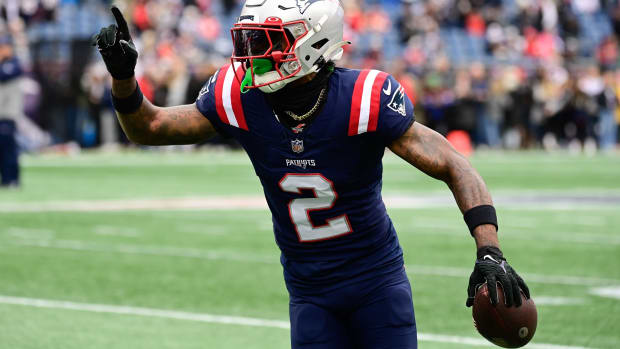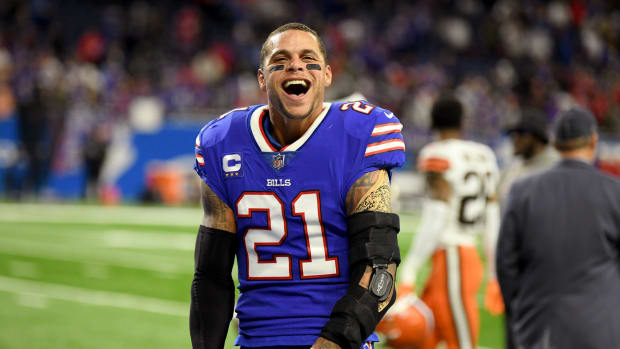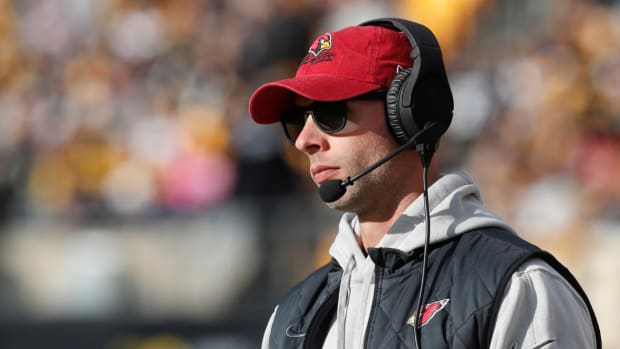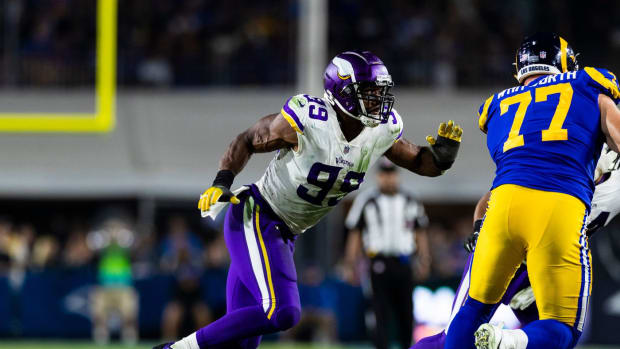Ezekiel Elliott’s Legal Saga Is Just Getting Started
U.S. District Judge Amos Mazzant III has a self-imposed deadline of 5 p.m. CDT on Friday to decide whether to temporarily restrain the NFL from imposing a six-game suspension on Dallas Cowboys running back Ezekiel Elliott.
No matter how Judge Mazzant decides, don’t expect Elliott’s legal saga to end on Friday. The saga could take many twists and its trajectory could involve multiple courts. In fact, we may not know for sure if Elliott will serve a suspension until 2018.
What to Expect on Friday
As detailed in previous SI legal articles on Elliott, Judge Mazzant will only grant a temporary restraining order (TRO) if Elliott convinces the judge of four factors: 1) he enjoys a substantial likelihood of success of proving that the NFL unlawfully conspired against him; 2) there is a substantial threat that Elliott would suffer irreparable harm—which normally refers to harm that can’t be remedied through monetary damages—if Judge Mazzant doesn’t grant the TRO; 3) the “injury” facing Elliott without a TRO would outweigh any damage to the NFL cause by an injunction; and 4) an injunction against the NFL and in favor of Elliott would not disserve the public interest.
Each of these factors lends itself to competing arguments, but given that Elliott carries the burden of proving all four factors, the odds favor the NFL on whether a TRO will be granted.
Judge Mazzant, however, enjoys substantial discretion in deciding whether these factors are met. This creates unpredictability as to how he will decide.
For example, Judge Mazzant might reason that he believes the NFL acted unfairly. This is especially true when the league inexplicably de-emphasized impressions shared by Kia Roberts, the NFL’s Director of Investigations and the only co-league investigator who interviewed Elliott’s accuser, Tiffany Thompson.
The Morning Huddle: What's Next for Ezekiel Elliott?
On the other hand, Judge Mazzant would recognize the countervailing fact that, under Article 46 of the collective bargaining agreement, NFL commissioner Roger Goodell enjoys substantial discretion and ultimate authority in deciding whether to punish players. Judge Mazzant would also be aware of the NFL’s legal victories over Tom Brady and Adrian Peterson. In their lawsuits, both players detailed various kinds of unfairness in how the NFL came to suspend them. Yet both players ultimately lost their cases because courts found they demanded procedural protections that their union, the National Football League Players’ Association, had failed to negotiate.
In this kind of a scenario, Judge Mazzant might conclude that he needs more time to determine if procedural unfairness by the NFL rose to unlawful conduct. He might also reason that Elliott’s missing games would damage his career in ways that money can’t repair. Judge Mazzant could then grant a TRO as something of an interim step.
If Judge Mazzant grants the TRO, it would be far from a lasting “win” for Elliott. In fact, it would likely last just two weeks.
A TRO would mean that Elliott, whom the NFL has permitted to play in Week 1 against the Giants, would also be eligible to play in Week 2 against the Broncos. That is, unless the NFL calls an audible and places Elliott on the commissioner’s exempt list. When placed on this list, players are paid but barred from reporting to work. The NFL used this list to prevent Adrian Peterson from playing without suspending him. If the NFL similarly used it with Elliott after Judge Mazzant grants a TRO, Elliott would probably rush back to court and ask the judge to grant another TRO—this one to stop the NFL from placing him on the exempt list.
In an alternative scenario where Judge Mazzant denies Elliott’s petition for a TRO, Elliott would probably be out-of-luck. He could and would appeal but an appeal would be poised to fail.
A Preliminary Injunction Would Be a Game-Changer
During any TRO period granted on behalf of Elliott, Judge Mazzant would consider a more lasting injunction against the NFL: a preliminary injunction. A preliminary injunction would be a game-changer. If issued, a preliminary injunction could conceivably last the entire 2017 season.
In deciding whether to grant a preliminary injunction, Judge Mazzant would once again weigh the four TRO factors listed above. This time around, however, both sides would produce more evidence and also offer additional testimony. Judge Mazzant would also be mindful of the impact of granting a preliminary injunction. It would mean that the NFL couldn’t carry out its suspension of Elliott until after the judge has carefully examined the lawfulness of the arbitration “award”—the award referring to hearing officer Harold Henderson’s decision to uphold Goodell’s six-game suspension of Elliott. Recall that U.S. District Judge Richard Berman took longer than a month to review Goodell’s arbitration award against Brady.
Ezekiel Elliott Suspension Case is Latest Legal Battleground for NFL vs. NFLPA
In the event Judge Mazant grants a preliminary injunction, it is unclear how quickly he would be able to review Henderson’s award. Like other judges, Judge Mazzant has a busy docket. He is scheduled to preside over trials that have been scheduled months in advance. It’s possible that Judge Mazzant wouldn’t be able to review Henderson’s arbitration award until later in the fall or even the winter. The more distant in time such a review is scheduled, the more likely Elliott could play the entire 2017 season.
Unlike with a TRO, the NFL could appeal a preliminary injunction to the U.S. Court of Appeals for the Fifth Circuit. The league would almost certainly invoke that right. A review by a three-judge panel on the Fifth Circuit, which is considered a relatively “pro management” court, could be conducted in days or weeks. The Fifth Circuit would probably pay particular attention to the Norris-LaGuardia Act of 1932. This Act prohibits judges from issuing an injunction in an on-going labor dispute. The NFL could portray Elliott’s dispute as an on-going labor dispute. If the Fifth Circuit agreed, it would stay Judge Mazzant’s preliminary injunction. The NFL could then impose its suspension on Elliott.
In other words, Elliott could gain a TRO and a preliminary injunction but then quickly face a suspension anyway. There are several points in the potential litigation timeline where Elliott could lose. In order to win he must run the table. The odds are stacked against him.
NFLMC v. NFLPA (Better Known as Brady v. NFL)
As an added twist, the NFL hopes to relocate Elliott’s litigation to U.S. District Court for the Southern District of New York. Late Tuesday, the NFL filed a petition in Southern District of New York with a request that it confirm Henderson’s arbitration award.
If the Elliott case is relocated to the Southern District of New York, the Brady decision would serve as binding precedent on it. Among other things, the Brady decision instructs judges that they are barred from reading new process rights into a CBA that the CBA doesn’t express. From a practical standpoint, Elliott would almost certainly lose to the NFL if forced to litigate in the Southern District of New York.
Analyzing NFL's Motions to Deny Ezekiel Elliott Restraining Order, Dismiss Lawsuit
Whether or not the case is relocated to New York will be up to Judge Mazzant. He will balance which forum is more appropriate to resolve the case. In doing so, he will place value on the fact that the litigation has already begun in Texas and that Elliott has obvious ties to Texas. Weighing in the opposite direction, however, is the fact that the NFL is headquartered in New York and both Goodell’s decision to suspend Elliott and Henderson’s hearing to review that suspension took place in New York.
The MMQB will keep you posted on key developments in this case.
Michael McCann is SI’s legal analyst. He is also an attorney and the Associate Dean for Academic Affairs at the University of New Hampshire School of Law.
Question? Comment? Story idea? Let us know at talkback@themmqb.com




































